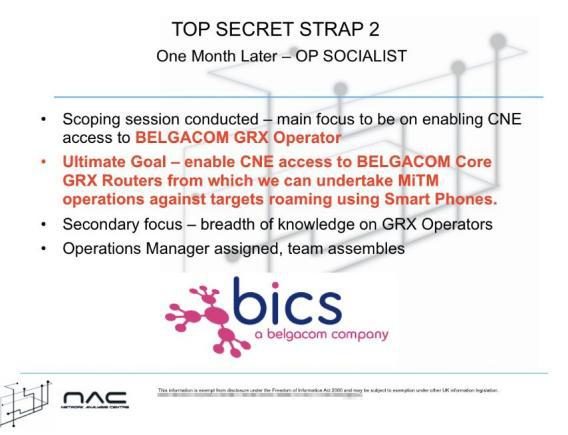“Operation Socialist” sounds like an anti-communist crackdown orchestrated decades ago by J. Edgar Hoover’s FBI. In fact, it was the name of a recent British covert surveillance mission that involved spies hacking into a Belgian phone network, according to newly leaked documents.
The secret files, disclosed by former NSA contractor Edward Snowden and published by Der Spiegel Friday, show how the British spy agency GCHQ hatched a plot to infiltrate Belgacom, a partly state-owned Belgian telecom company. Belgacom’s customers, according to Der Spiegel, include institutions like the European Commission, the European Council, and the European Parliament. Earlier this week, the telecom company said that it believed it had been subject to a “digital intrusion” and filed a report with the country’s federal prosecutor. But only now have the details about the spy attack surfaced.

Slide published by Der Spiegel
The newly revealed documents show GCHQ ‘s “Network Analysis Center” outlining a plan to infiltrate routers used by Belgacom in order to spy on the communications of targets using smartphones. The surveillance was apparently conducted using a so-called “man-in-the-middle” attack, which usually involves covertly intercepting data by using fake security certificates in order to reroute and snoop on data. (As I reported here last week, a similar tactic appears to have by used by the NSA or GCHQ to intercept data sent to Google servers.)
As part of “Op Socialist,” GCHQ was apparently using some surveillance technology that was developed by the NSA. One of the tools used was a kind of specialized spy Trojan called a “Quantum Insert” to target Belgacom employees. According to Der Spiegel, this
“appears to be a method with which the person being targeted, without their knowledge, is redirected to websites that then plant malware on their computers that can then manipulate them. Some of the employees whose computers were infiltrated had ‘good access’ to important parts of Belgacom’s infrastructure.”
The disclosures are yet another illustration of the extremely aggressive scope of the clandestine spy operations that have been conducted by both the United Kingdom and the United States. Infiltration of computer networks is usually more commonly associated with Russian and Chinese government hackers, but the British and Americans are at it, too, even targeting their own allies’ communications. The surveillance tactics appear to have few limits, and while government officials have played up the necessity of the spying for counter-terrorism, it is evident that the snooping is often highly political in nature.
It is unclear whether “Operation Socialist” was directed at monitoring left-leaning European politicians or citizens, but that Belgacom was a target at all suggests that the motivation may have been to glean information about officials’ activity in the European Parliament in Brussels. Other recent reports have shown GCHQ has gone after both European Union and United Nations officials and infiltrated government officials’ phones with spyware during a London conference in 2009. The NSA has adopted similar tactics, spying on Brazilian and Mexican leaders’ communications and reportedly hacking Chinese phone networks to monitor text messages.
The European Parliament, prompted by the Snowden leaks, is currently investigating the scope of the surveillance. The infiltration of Belgacom will no doubt form a part of the inquiry. Meanwhile, the Belgian government can be expected to respond angrily, with yet another diplomatic spat developing as a result of the snooping. Even before the Spiegel report was published Friday, the country’s prime minister was gearing up for a fight, describing any potential espionage attack on Belgacom as a “violation of a public company’s integrity.”
